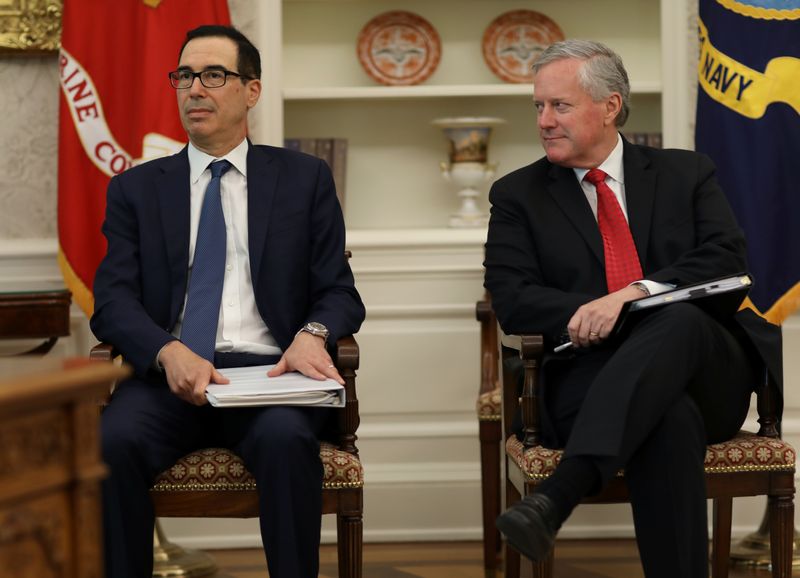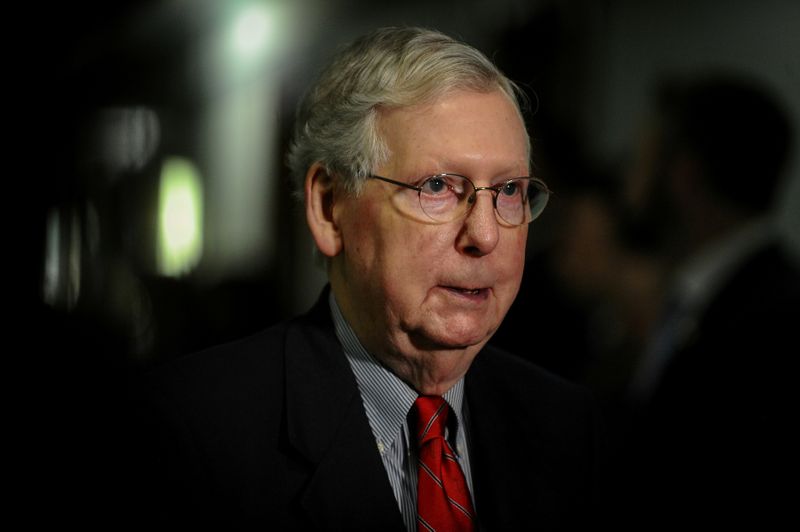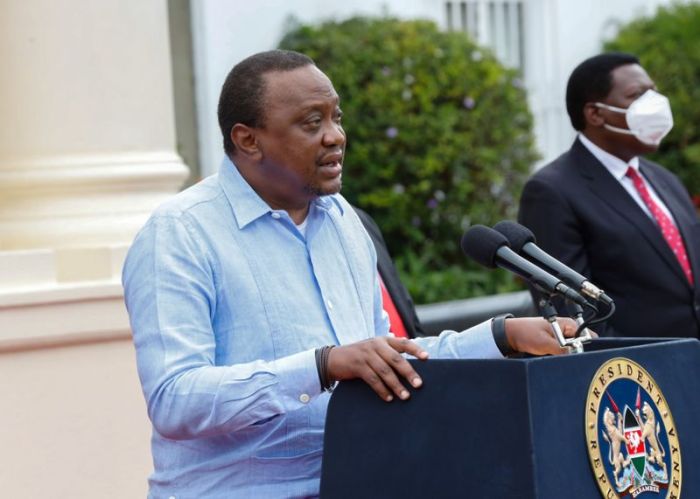WASHINGTON (Reuters) – Senate Republicans on Monday proposed a $1 trillion coronavirus aid package hammered out with the White House, paving the way for talks with Democrats on how to help Americans as expanded unemployment benefits for millions of workers expire this week.
Senate Majority Leader Mitch McConnell called the proposal a “tailored and targeted” plan focused on getting children back to school and employees back to work and protecting corporations from lawsuits, while slashing the expiring supplemental unemployment benefits of $600 a week by two-thirds.
The plan sparked immediate opposition from both Democrats and Republicans. Democrats decried it as too limited compared to their $3 trillion proposal that passed the House of Representatives in May, while some Republicans called it too expensive.
McConnell said the package would include direct $1,200 payments to Americans, as well as incentives for the manufacture of personal protective equipment in the United States, rather than China.
It also includes $190 billion for loans to help small businesses, and $100 billion for loans to businesses that operate seasonally or in low-income areas.
Republicans want to reduce the expanded unemployment benefit from the current $600 per week, which is in addition to state unemployment payments and expires on Friday, to $200 in addition to state unemployment.
After two months, states would implement a new formula that replaces about 70% of lost wages.
The supplemental unemployment has been a financial lifeline for laid-off workers and a key support for consumer spending. The extra funds – exceeding the former wages of some workers – have been a sticking point for many Republicans, who say they encourage Americans to stay home rather than go back to work.
Democrats, in turn, have criticized the Republican delay in writing more legislation as confirmed U.S. coronavirus cases passed the 4 million mark. The pandemic has killed nearly 150,000 people in the United States.
Negotiations started immediately after the Republican package was introduced. House Speaker Nancy Pelosi and Senate Democratic Leader Chuck Schumer met for nearly two hours with Treasury Secretary Steven Mnuchin and White House Chief of Staff Mark Meadows.
Meadows said afterwards that it was a “good meeting” and that he and Mnuchin would return to Capitol Hill on Tuesday. But Pelosi and Schumer, speaking to reporters, expressed frustration that items like rental and food assistance had been left out.
“We hope that we would be able to reach an agreement. We clearly do not have shared values. Having said that, we just want to see if we can find some common ground to go forward. But we’re not at that place yet,” Pelosi said.
LIABILITY PROTECTIONS AND DEFENSE SPENDING
The Republican-led Senate refused to consider the House coronavirus relief bill, known as the “HEROES Act,” that was passed in May.
McConnell on Monday called the House bill a “socialist manifesto” and urged Democrats to work with Republicans on their plan, the “HEALS Act.”
“We have one foot in the pandemic and one foot in the recovery,” McConnell said. “The American people need more help. They need it to be comprehensive, and they need it to be carefully tailored to this crossroads.”
The proposal included “strong legal liability protection” for corporations, a top Republican priority.
It includes nearly $30 billion for the military and defense industry, in addition to nearly $760 billion already enacted for defense this year – including more than $10 billion in previous coronavirus relief bills.
Opposition from some of McConnell’s fellow Republicans, as well as from Democrats, signaled a tough road ahead.
“The answer to these challenges will not simply be shoveling cash out of Washington. The answer to these challenges will be getting people back to work,” Republican Senator Ted Cruz told reporters.
Some Republicans had complained about the high price tag. The federal government has already spent $3.7 trillion to cushion the economic blow from pandemic-forced shutdowns.
Schumer said the Republican plan did too little, too slowly, to help Americans facing joblessness and eviction. “The Republican plan is weak tea, when our problems need a much stronger brew,” Schumer said.
He said many states had warned they would have a hard time implementing unemployment changes. Many Americans waited weeks for previous coronavirus benefits, as outmoded state computer systems adjusted.
The Republican proposal also includes measures not directly related to the COVID-19 outbreak, including $1.8 billion for construction of a new FBI headquarters in Washington, something championed by President Donald Trump, who owns a hotel across the street from the current building.
(Reporting by Susan Cornwell and David Lawder; writing by Patricia Zengerle and Richard Cowan; Editing by Scott Malone, Leslie Adler, Rosalba O’Brien and Sonya Hepinstall)


























